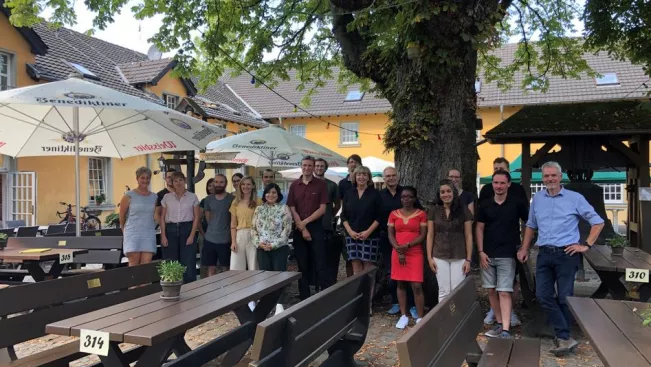International Centre for Sustainable Development (IZNE)
In the Service of Sustainable Development - IZNE Conference

Sustainability strategy: Tools for sustainable development
Professor Wiltrud Terlau began by presenting the goals of the H-BRS sustainability strategy. The overarching goal of all activities is a climate-neutral and environmentally friendly campus. To achieve this, there are already numerous different projects and ideas, such as the accreditation of new sustainability study programmes, sustainability-related offers in the existing study programmes and research for the expansion of renewable energies. The focus is on the interaction of social, ecological, economic and technical sustainability. With the numerous projects for sustainable development and responsible action, the IZNE bundles the required competences in this field of action and contributes to initiating and accompanying sustainable reform, innovation and change processes. The IZNE welcomes the sustainability strategy that has now been adopted.
"Raising awareness and participation among university staff is also a crucial point in the transformation process," says Professor Terlau. Through collaborative research, also between the departments, university staff, students and researchers should integrate the topics of sustainability and digitalisation into their work and studies. The fields of action are numerous and it is important to help shape and implement the global tasks with effects on society. Through the research projects, recommendations for action are to emerge for the realisation and implementation of the strategy in practice. "We need the tools for sustainable development," says Professor Terlau.
ZEV - Sustainable Action Needs Science and Ethics: Creating Opportunities for Ethical Reflection
The next item on the agenda was the presentation of the Centre for Ethics and Responsibility by ZEV's Managing Director Professor Klaus Lehmann. ZEV wants to have an action-activating effect in the fields of natural science, politics and social affairs and bring society and the university closer together. The focus is on ethical reflection on one's own actions. "This helps to overcome obstacles in the transformation process," says Professor Lehmann. The search for fields of application, clarification of complex questions such as the human-nature relationship and questions about the future of democracy also play a major role. As Professor Lehmann emphasised several times, ZEV works together with IZNE as a "sibling institute". In cooperation with the IZNE, ZEV's "Study Responsibility" offers students at the H-BRS the opportunity to engage with current social, ecological and digital change processes in a practical and application-oriented way beyond their own studies. The accompanying study programme, which lasts several semesters, is completed with a sustainability certificate and can be individually designed.
IZNE: Integrating sustainable development into science, research and transfer
Afterwards, the IZNE Directorate consisting of Professor Meilinger, Professor Terlau, Professor Bender and Professor Hamer presented the four main research areas of the IZNE.
- Sustainable Technologies and Resource Usage (Prof. Meilinger)
- Sustainable energy systems
- Sustainable mobility
- Energy solutions for developing countries
- Technological transformation processes
-
Responsible Economy and Natural Resources (Prof. Terlau)
- Socio-ecological transformation
- Green Economy
- Sustainable / Resilient Cities: Urban Green
- Education for Sustainable Development
-
Health and Social Protection (Prof. Bender)
- Political-economic & institutional-economic analyses of reforms of social security and health care systems
- Social security, health and technology: interactions between technological and institutional change
- One Health
- Soils and Biomass (Prof. Hamer)
- Interaction between agriculture, nutrition & environment ("One Health")
- Utilisation potentials of renewable raw materials
- Impacts of land use change
- Assessments of soil degradation
The different professional backgrounds enable a more holistic view of problems and the development of innovative, interdisciplinary solutions. Building bridges between research and practice is the focus of all activities.
Afterwards, the group divided into several subgroups and discussed concrete topic ideas on which the four research fields could collaborate more interdisciplinarily in the future.
In the future, the IZNE would like to increase internal cooperation in order to work even more interdisciplinary. The participants were able to round off the day with jazz music and dinner.
The platform for research and transfer at the H-BRS provides further information on the professors' research fields as well as information on cooperation opportunities.
- Innovationmall – Nachhaltige und resiliente Städte
- Innovationmall – Biodiversität
- Innovationmall – Green Economy
- Innovationmall – Ernährung der Zukunft
- Innovationmall – Umwelt und Bodenschutz
- Innovationmall – Klimaschutz, erneuerbare Energien und Energieeffizienz
- Innovationmall – Klimawandel und Klimafolgeanpassung
- Innovationmall – LCA und Ökobilanz
- Innovationmall – Risiken und Resilienz
- Innovationmall – Soziale Sicherungs- und Gesundheitssysteme aus globaler Perspektive
- Innovationmall – Wechselwirkungen zwischen institutionellem und technologischem Wandel
- Innovationmall – Gesundheit und One Health